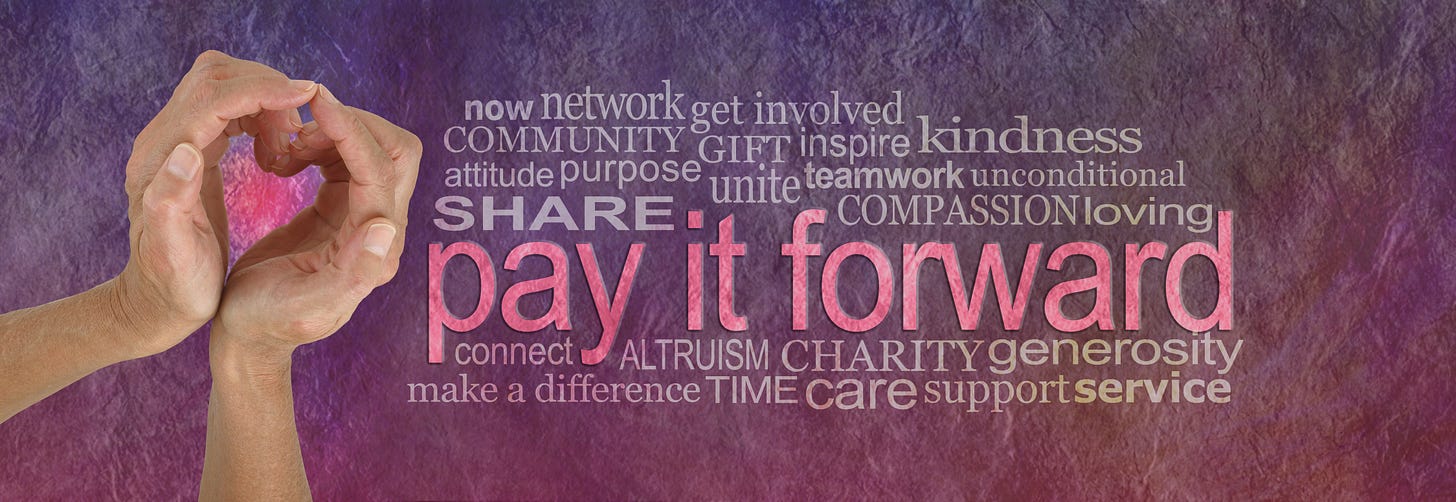9 Ways to Accept Feedback With Grace—and Grow From It
Tips to Ensure You Receive Feedback with Dignity
Welcome to ValuesCrafting!
Today's newsletter deals with a concept in values-based living we may not often think about. Lots of information exists about how to give feedback that works including my article. But, more rarely you learn about how to create a welcoming environment for honest, helpful feedback. Find nine key factors you control.
For our new readers, I've included a brief list of essentials to help you join our community.
This month, we'll continue to explore the values we express in our relationships—whether with friends, family, or colleagues. It's not just about hugs and family text messages, though those are great, too.
We post links to our newsletter content on social media a week after it appears in ValuesCrafting. So by subscribing, you get the first look and in-depth insights straight to your email. Please share our newsletter with others who might benefit from it. We can grow our audience only with your help.
Your thoughts and suggestions play a crucial role in shaping our future content. We deeply appreciate your input and will continue to provide the weekly and shorter pieces you've requested.
Thank you for being an essential part of the ValuesCrafting community. Let's explore what keeps us from creating a home or work environment in which honest, helpful feedback is welcomed. We are committed to supporting your growth and development.
Warmly,
Susan9 Ways to Accept Feedback With Grace—and Grow From It
Are you curious about how others perceive your work and contributions? If so, make it easy for them to share honest, thoughtful feedback. When people know you'll appreciate their input, they're more likely to give it. And trust me, that's a good thing. Let me share a personal example.
I'm new to the Substack community, the platform I use to send the ValuesCrafting newsletter. So, I wasn't sure how people would respond to feedback—or even if they genuinely wanted it, especially negative feedback, as constructive feedback is often perceived. But I took a chance because a writer's story nearly moved me to tears. (If interested, the link is to the conversation in the Substack chat app.)
She asked for a potential title and feedback on the story about a mom and her child born with severe congenital disabilities, specifically whether the ending worked. For me, it didn't. So, I told her what I thought the ending conveyed and suggested a title, too.
Her response was gracious: "Thank you. I appreciate your honest feedback. I'll try to rework the ending. My aim was to circle back to the fact that her face was what jarred me and made me believe I didn't love her. And then I realized I did, right before her face was going to be surgically altered."
Because all honest feedback deserves acknowledgment, I replied, "It is hard to give difficult feedback, especially on a platform I'm just learning about. Your response was so perfectly encouraging for me that I am more comfortable offering comments that people might find useful again.”
Honest Feedback Leads to Improvement
This example shows how thoughtful feedback fosters growth, both personally and professionally. It's a gift that those who care about your success can provide, but they'll only offer honest feedback if they feel safe and comfortable doing so.
If you react defensively, it can harm your relationships, whether at work or home. Colleagues, managers, and even family members might hesitate to give you feedback if they fear a negative reaction. They need to feel safe when they enter your personal space, which is what we do when we give feedback.
This lack of approachability can stall your growth, limit your improvement opportunities, and affect your ability to interact as your authentic self.
When you react defensively to feedback, it can have a detrimental effect on your professional and personal relationships. Coworkers and managers, who are crucial for your success, may be less likely to approach you with helpful feedback. Your inapproachability can hinder your group's progress, which is a loss for everyone involved.
It's particularly unfortunate when this defensiveness affects your relationship with your manager, whose feedback is crucial for your development. If you react defensively, you make an uncomfortable role even more challenging for them.
Instead, you can create an environment where feedback is welcomed, and you'll receive more of it—feedback essential for your growth and success.
Let's look at a family example. My husband and I have a good food culture. We both often cook and experiment with herbs, spices, cooking techniques, and new dishes. Imagine asking how he enjoyed a new dish and hearing, "I didn't like it." Helpful? Not really.
But consider this helpful feedback instead, "I thought the roast was slightly overcooked using the low and slow oven method, but let's talk about what will make it better next time. It tasted good."
Honest, helpful feedback leads to terrific conversations and productive results. Will I try the low and slow cooking method again? You bet. I'll incorporate the suggestions, too.
How to Receive Feedback
Remember these nine essential tips to receive feedback with grace.
Be Approachable
As illustrated in the above examples, you must demonstrate your openness to receiving feedback through positive body language, attentive facial expressions, and a welcoming manner.
One of the best ways to solicit input from valued others is to ask for their thoughts on specific situations. You can ask, “How could I have handled that conversation differently?” “How could I have approached this situation more effectively?”
Taking responsibility for initiating feedback encourages others to be honest and constructive. The key is to open the door to objective feedback by asking and controlling your behavior and reaction when receiving honest, helpful feedback.
Be Mindful of Your Defensiveness
Try to control your defensiveness. When your colleague or family member fears a negative reaction or dealing with defensive or justifying behavior, they will hesitate to give you constructive feedback. If you can create an aura of approachability, people are more likely to return with more feedback.
Defensiveness, anger, justifying, and excuse-making will make people uncomfortable giving you feedback. If you become defensive or hostile, practice stress management techniques such as taking a deep breath and letting it out slowly. You can also formulate questions in your head to better understand the feedback you are receiving.
Listen to Understand
Practice the skills of an effective listener using body language and facial expressions, your nonverbal communication, to encourage the other person to talk. You can nod your head encouragingly and make accepting comments such as, “I see” or “Tell me more.” These signals show you're genuinely interested and encourage the other person to continue sharing.
Suspend Your Judgment While Listening
After all, learning the views of the person providing feedback teaches you about yourself and how others interpret your actions. Focus on truly understanding the feedback before forming an opinion.
This approach helps you absorb the feedback more fully and reduces defensive reactions. Noted consultant and author Tom Peters famously said, "Perception is all there is."
By understanding others' perceptions, you gain valuable insights into how your actions are viewed.
Summarize and Feed Back What You Hear
The person giving you feedback will appreciate that you are hearing what they are saying. Rather than using the little voice in your brain to argue, deny, or formulate your response, focus on clarity and understanding.
Repeat back what you've heard to ensure you understood correctly. For example, “If I understand you correctly, you're saying...” This technique shows you value the feedback and helps clarify any misunderstandings.
You are also checking out the validity of what you hear, which can be difficult for many of us, depending on how stressful we perceive the situation. We may focus on the first statement made and miss the rest while arguing internally.
Ask Questions to Ensure Clarity
Instead of arguing with feedback, focus on questions to ensure you understand the input. Ask open-ended questions like, “Can you give me an example?” or “What makes you feel that way?” Once again, focus on understanding what is being said rather than on your subsequent response.
Ask for examples and stories illustrating the feedback so you know you share meaning with the person providing it. Sharing meaning is my long-term, short definition of communication.
You Don't Need to Agree with the Feedback, Make Sure You Hear It
You don't have to agree with every piece of feedback you receive, but make sure you fully understand it. People see your actions but interpret them through their perceptual screens and life experiences.
Check with others to determine the reliability of the feedback. If only one person believes it about you, it may be just them, not you.
Remember, only you have the right and the ability to determine the relevance of the feedback you receive.
Show Appreciation
Try to show your appreciation to the person providing the feedback. It's tough to give helpful, honest feedback. If you found the feedback valuable, let the person know. They'll feel encouraged; believe it or not, you want to encourage more feedback.
A simple “Thank you for sharing that with me; I appreciate your honesty” can go a long way in encouraging others to provide valuable input in the future.
At work, even your manager or team members find providing feedback scary. They never know how the person receiving feedback will react. Express gratitude for the feedback even when it’s tough to hear to create an environment conducive to growth and learning.
Reopen the Discussion (If Needed)
If you disagree with the feedback or need clarification, wait until you've processed the feedback calmly before revisiting the discussion. Start by acknowledging the initial feedback and expressing gratitude.
You considered the feedback and checked with other people to see if others agreed. Then, share what you've learned from seeking others' opinions and ask specific questions to clarify misunderstandings.
You might discover they were thinking about something entirely different, or perhaps you didn't share any meaning at all. This approach fosters open communication and mutual understanding.
Concluding Thoughts
Receiving feedback with grace and openness is a skill that can profoundly impact your personal growth and professional development. Embracing these recommendations creates an environment where honest, constructive feedback is welcomed and encouraged.
Remember, every piece of feedback is an opportunity to learn, grow, and become the best version of yourself. So, the next time someone offers their perspective, listen carefully, respond thoughtfully, and appreciate the chance to improve—you can become more approachable and receptive to feedback.
ValuesCrafting Compass: Curated Resources for Value-Driven People
These curated resources provide valuable perspectives on giving and receiving feedback. Explore them to deepen your understanding and application of this fundamental value-added task.
Uncommon Courses is an occasional series from The Conversation U.S. highlighting unconventional approaches to teaching. “Good feedback is an art – here’s how I teach it” by Patrick Barry, Clinical Assistant Professor of Law and Director of Digital Academic Initiatives at the University of Michigan. Find insightful information on giving and receiving feedback.
At the Management Center, you can find another perspective and approach to receiving and giving feedback. See “How to Receive Feedback (Part 1).”
On ValuesCrafting, you will find more information about “How to Give Feedback That Works.”
Essentials for New ValuesCrafting Readers
What Exactly Are Core Values? Core values are traits, integrities, or qualities that are not just worthwhile. They represent an individual or an organization’s highest priorities, deeply held beliefs, and core, fundamental driving forces.
12 Deeply Held Beliefs: Explore the deeply held foundational values, beliefs, and principles that underlie the information and approaches recommended on ValuesCrafting and at SusanHeathfield.com.
The ValuesCrafting Journey: Especially for people in positions that influence the actions of other people, this is the story behind ValuesCrafting and my own journey with values-based living, writing, and consulting.





